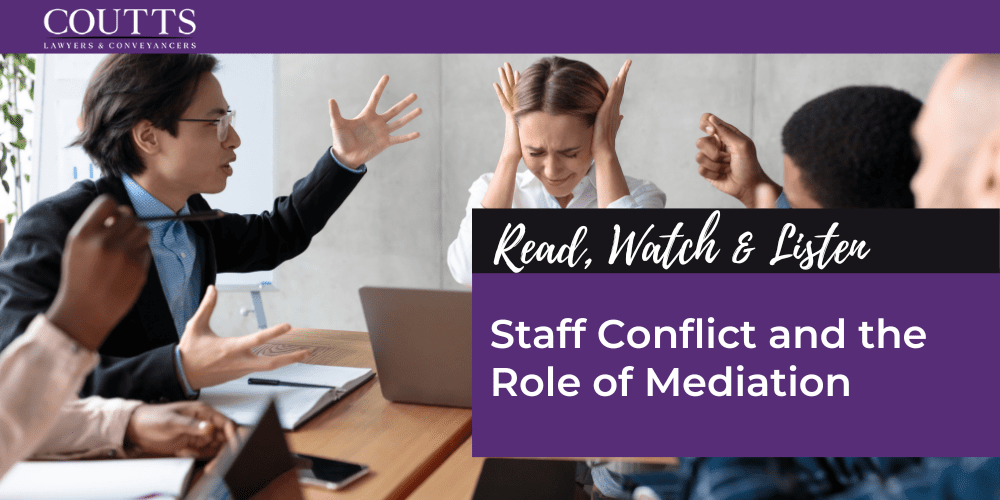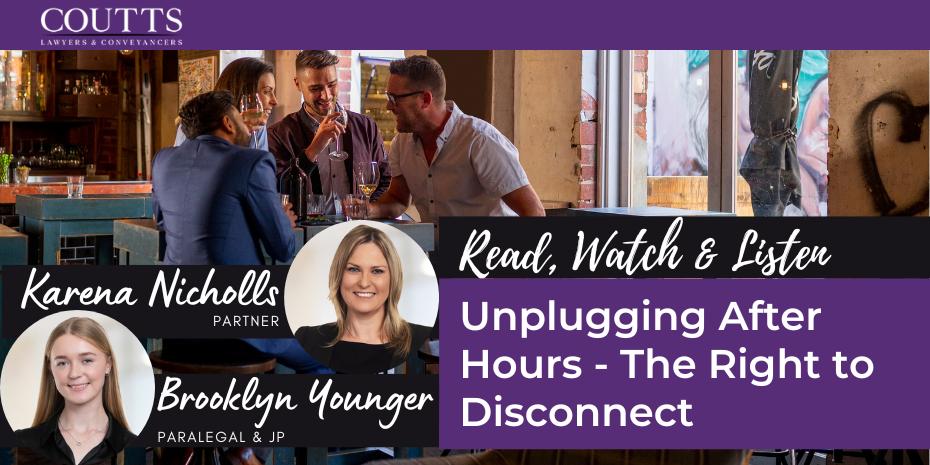Conflict is a part of life and is a normal aspect of any relationship. The workplace is no exception. Unresolved conflict in the workplace can affect performance, breed discord, increase the risk of mental health issues, lead to workplace bullying, put staff’s safety at risk and be highly disruptive to the workplace.
In this article we seek to answer the following questions about staff conflict:
- What should an employer do when there is conflict between staff in the workplace?
- Is it appropriate for an employer and/or manager to mediate conflict between staff members?
- What are the pitfalls of an employer and/or manager mediating staff?
- What is the best solution when staff are in conflict?
Conflict is a common, inevitable part of life. Think back on your friendships during school, your first romantic relationship, your current romantic relationship, your relationship with your children, your parents, your neighbours or even the person who makes your latte every morning. Relationships, unless you live in complete isolation cannot be avoided.
Then there are your work relationships. Your relationship with your boss, your manager, your colleagues. A multitude of personalities coming together on a regular basis. They say you can choose your friends, but you can’t choose your family. I would add work colleagues to that list.
What should an employer and/or manager do when there is conflict between staff?
It is tempting to ignore the problem, wait and see what happens or have an attitude that they are adults/professionals they can work out their differences. On the face of it that is a reasonable response, but it is risky. As an employer and/or manager and it comes to your attention that there is ongoing conflict in the workplace you have a duty to address the issue.
The key word here is ‘ongoing’ conflict. We are not talking about a staff member being annoyed because someone took the last of the coffee and put the jar back on the shelf. We are referring to the type of conflict that is having a negative impact on the individual and by default the team. Common examples of workplace conflict can include personality differences, a perception that team member not pulling their weight or a staff member dominating decisions. If this is happening, then you have a duty to intervene and offer solutions. One of the solutions could be mediation.
Mediation is a voluntary, confidential, future focused process. The role of the mediator, who is impartial, is to facilitate a safe environment to explore the issues between the parties with the goal of coming to a workable resolution.
Is it appropriate for an employer and/or manager to mediate conflict between staff members?
Again, it is tempting as a manager and/or employer to put on the mediator hat and attempt to resolve the conflict between your staff by conducting a mediation.
Mediation is a complex process it is not a matter of simply putting two warring parties in a room to hash out their differences and come to a new understanding. If not done correctly the outcome could be damaging and place you in a precarious position.
When preparing to conduct a mediation there are a number of aspects that need to be considered before the mediation can commence. For example:
- How the mediation is to be conducted;
- Is there a power imbalance;
- Is there a history of intimidation;
- Is there a history of mental health;
- Do the parties require a support person; and
- Are the parties consenting to participate in a mediation.
When individuals agree to participate in a mediation, they are trusting the mediator to lead them through a challenging and confronting process. This should not be done lightly and without someone trained in conflict resolution.
What are the pitfalls of an employer and/or manager mediating staff?
The biggest risk of and employer and/or manager conducting a mediation is you could cause more harm to the parties. Mediation is confronting and without due care and skill can be traumatic for the parties.
What is the solution when staff are in conflict?
Engage a qualified mediator. When you engage a qualified mediator the first message you are sending to your staff is that you care about them and their workplace. When staff know this, they are more likely to come forward when there is an issue.
Secondly, when you engage a mediator you are protecting not only the integrity of the mediation, the parties but also the position of employer and/or manager. After the mediation is concluded everyone including the employer and/or manger need to continue with their job. Having the employer and/or manger conduct the mediation could have a lasting impact on their role moving forward.
Finally, mediation, when done by a qualified mediator provides a forum and an opportunity for parties to gain understanding, to be heard and to explore options on how to work with each other. The unique nature of mediation is that the mediator can specifically tailor the mediation to suit the needs of the parties.
If you would like more information about conflict resolution or how mediation can improve your workplace contact our mediation team.
For further information please don’t hesitate to contact:
info@couttslegal.com.au
1300 268 887
Contact Our Coutts today.
This news is merely general and non specific information on the subject matter and is not and should not be considered or relied on as legal advice. Coutts is not responsible for any cost, expense, loss or liability whatsoever in relation to this information, including all or any reliance on this as a blog or use or application of this blog by you.
This blog is merely general and non specific information on the subject matter and is not and should not be considered or relied on as legal advice. Coutts is not responsible for any cost, expense, loss or liability whatsoever in relation to this blog, including all or any reliance on this blog or use or application of this blog by you.



